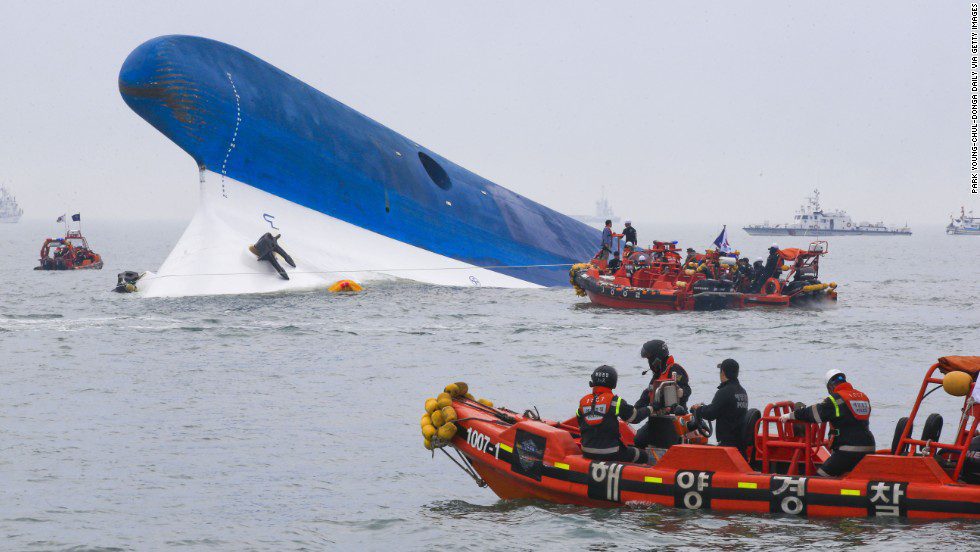Trump Trade Wars: A Look At Winners And Losers Since 2016
by Tom Orlik (Bloomberg) Who Loses in Trump’s Endless Trade War? In 2016, Donald Trump campaigned for the US presidency on a promise to beat China. Once in office, he unleashed a...

Rescue boats sail around the South Korean passenger ship “Sewol” which sank, during their rescue operation in the sea off Jindo, in this April 17, 2014. REUTERS/Kim Kyung-Hoon
by Jiyeun Lee (Bloomberg) Extravagant dinners with whiskey and wine, golfing weekends, pricey beef and seafood gift sets. South Korean companies are trying to figure out how to do without these common forms of business hospitality before the nation’s toughest-ever anti-graft law takes effect next month.
Conglomerates LG Group and SK Holdings are among those preparing information sessions for employees to ensure they comply with the new law. The Korea Chamber of Commerce is holding seminars, and retailers and restaurants are expanding their offerings of low-cost meal sets and gifts.
The law will weaken practices referred to in South Korea as “jeopdae,” which focus on entertaining business colleagues, government officials and journalists. Passage of the legislation came after public anger boiled over when ties between regulators and the shipping industry were exposed in the wake of the 2014 Sewol ferry disaster.
South Korea has seen a dozen high-profile corruption cases this year alone, including the arrest of a senior national prosecutor on charges of accepting bribes from the founder of the country’s largest on-line game maker. Personal relations between those in business and the public sector have often led to lax supervision or illicit favors.
Lotte Group Vice Chairman Lee In Won was found dead last week, just hours before he was due to be questioned by prosecutors in connection with an investigation into alleged corruption at the conglomerate, one of the country’s largest. A four-page letter was found in a car nearby, police said. Lotte has said it’s cooperating with prosecutors and declined to comment on the allegations.
The nation ranked 37th out of 168 countries in Transparency International’s corruption perceptions index last year, behind regional peers Japan, Taiwan and Singapore. About 60 percent of South Koreans surveyed by the country’s Anti-Corruption & Civil Rights Commission in 2015 said they thought Korean society was corrupt.
While there has been little debate about the importance of improving transparency, some say the new spending restrictions will dent consumption and hurt the food, agriculture and leisure industries. Finance Minister Yoo Il Ho and Bank of Korea Governor Lee Ju Yeol have both cited the anti-corruption law as a risk to the economic growth rate.
In China, President Xi Jinping’s anti-corruption campaign has seen fallout affecting ed everything from luxury good prices in Hong Kong to gambling revenue in Macau.
Under South Korea’s new Improper Solicitation and Graft Act, government employees, teachers and journalists will be subject to fines if they are treated to meals worth more than 30,000 won ($27) — including drinks — or receive gifts worth more than 50,000 won. So will the companies that provide them.
The Korea Economic Research Institute estimates the law could cost affected industries about 11.6 trillion won annually. The food industry would see the biggest hit — about 8.5 trillion won each year, the institute estimated.
The agriculture ministry is among several government agencies urging the anti-graft commission to lift the price limit to at least 50,000 won for meals and to 100,000 won for gifts. The commission will release a final decision on limits before the law takes effect Sept. 28.
Some businesses on the receiving end of jeopdae spending aren’t waiting for the commission’s final decision.
Korean seafood restaurant chain Haewoori will introduce a new dinner set costing 29,000 won, said Kim Eun Hee, the company’s marketing manager.
“Previously, the cheapest dinner set was 36,000 won,” Kim said. “Since the law sets the limit at 30,000 won per meal including drinks, we plan to allow customers to bring their own alcohol with no corkage charge.”
Lotte and Shinsegae department stores have increased the number of gifts priced at 50,000 won or below, partly in response to the new spending restrictions as well as growing demand for lower-priced gifts.
The new anti-graft law will promote fairer competition, a long-term positive for the economy, said Shin Kwang Yeong, a professor of sociology for Chung-Ang University in Seoul.
“Some business traditions in Korea have been a hurdle for the economy to become more globalized and open. Now there is an opportunity to change this,” Shin said.
Kim Mun Cho, a professor emeritus at Korea University in Seoul, warned that the new rules could also have unintended consequences.
“The limits are expected to draw support from the public, but we could see other private, secretive ways of forming business relations emerge,” Kim said.
©2016 Bloomberg News

Sign up for gCaptain’s newsletter and never miss an update

Subscribe to gCaptain Daily and stay informed with the latest global maritime and offshore news


Stay informed with the latest maritime and offshore news, delivered daily straight to your inbox
Essential news coupled with the finest maritime content sourced from across the globe.
Sign Up